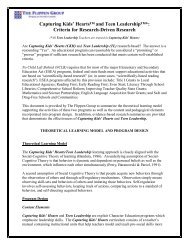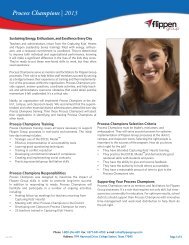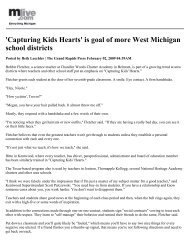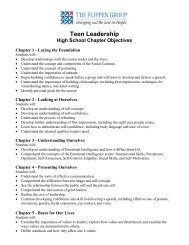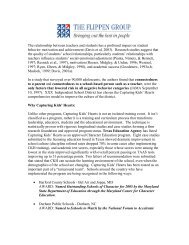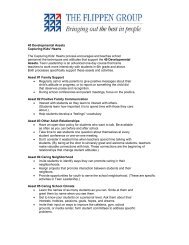Smart & Good High Schools - The Flippen Group
Smart & Good High Schools - The Flippen Group
Smart & Good High Schools - The Flippen Group
- No tags were found...
You also want an ePaper? Increase the reach of your titles
YUMPU automatically turns print PDFs into web optimized ePapers that Google loves.
CHAPTER 1: <strong>The</strong> Call to Characterting jobs or take dead-end jobs that offer low status, littletraining, and pay too low to support a family. Even at agethirty, a large portion of high-school graduates continue tohold low-paying, high-turnover jobs.Youth who do not go to college are“the forgotten half” because societyoffers them no way to enter adult roles.In Rosenbaum’s research, plant supervisors gave exampleafter example of high school graduates who lack basicskills in math, English, or reading. One suburban manufacturersaid, “Today’s high school students don’t comprehendas much. It takes them longer to catch on toinstructions, and they can’t read manuals as well as theyused to.” A Chicago metal-parts manufacturer complainedthat even though his entry-level jobs require only7th-grade reading and math skills, he has a “terrible timegetting even a 10% yield” for these skills in the applicantshe interviews. 32What has brought about this state of affairs?Rosenbaum pinpoints several factors:◆ Many high school students don’t work hard and developstrong academic skills because they think gradesdon’t matter.<strong>The</strong> research shows that high school grades: (a) predictjob performance, and (b) have strong effects on laterearnings (although no effects on early earnings). But,Rosenbaum says, this is not known either by high school studentsor employers, neither of whom see high school grades asimportant.Believing, erroneously, that high school grades don’t predictjob performance, employers unwittingly contribute tostudents’ low motivation to work in high school by ignoringtheir grades. One study found that most employers donot ever request high school transcripts. 33Ironically, as Rosenbaum points out, grades provide veryinexpensive signals of youths’ work habits and their skillsin reading, writing, and math—the very qualities thatemployers say they need.◆ <strong>High</strong> schools don’t teach the character skills employerswant.In survey after survey, employers rate “character skills”such as attendance, deportment, dependability, initiative,and ability to work with others—what our report calls“performance character”—as highly important. If employersfind that newly hired workers lack these qualities, theydo not train them—they fire them.However, high schools typically do not focus on the characterskills that employers value so highly. “Many employersreport that some new workers are absent or late to workseveral days in the first week on the job, do poor-qualitywork, and talk back to supervisors. Students have learnedthat they can get away with these behaviors in high school,so they are surprised when employers fire them.” 34◆ Many high school educators advocate “college forall”—without helping low-achieving students realize theimportance of high school grades and without helpingthem make back-up plans.If employers find that newlyhired workers lack character skills,they fire them.According to the National Educational LongitudinalStudy, nearly all seniors (95%) now say they plan toattend college. But only half of college entrants actuallycomplete a degree. Rosenbaum analyzed student outcomedata from the National Educational LongitudinalStudy, which followed more than 14,000 high school studentsbeginning in 1988. <strong>The</strong>se were his major findings:1. Many low-achieving high school seniors believe theycan earn a college degree.2. Students who believe they can earn a college degree inspite of low achievement exert little effort in highschool.3. <strong>High</strong> school grades are the best single predictor, forboth blacks and whites, of whether students finish college,but students do not anticipate this relationship.4. Students whose high school achievement was low getless economic payoff (as measured by job pay) from acollege degree.Rosenbaum derives two important policy recommendationsfrom these data:1. <strong>Schools</strong> and society should stress to high school studentsthe importance of high school achievement as aAll sober inquirers after truth, ancient and modern, have declared that ourhappiness as well as our dignity consists in virtue.<strong>Smart</strong> & <strong>Good</strong> <strong>High</strong> <strong>Schools</strong>—JOHN ADAMS




